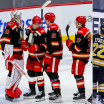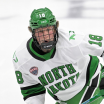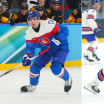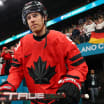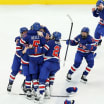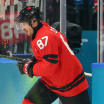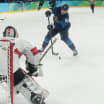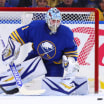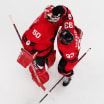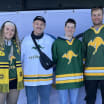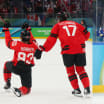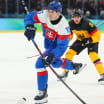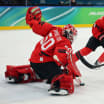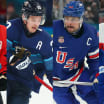OLOMOUC, Czech Republic -- David Krejci plunked himself down in the front row of the auditorium-style seating in a meeting room at the Boston Bruins practice rink. It was his first day back on the ice with them after a year away playing in his home country of the Czech Republic, and it felt old and new, familiar and alien.
Krejci grateful for season in Czech Republic before returning to Bruins
Center cherishes chance to play in front of parents, brother near hometown
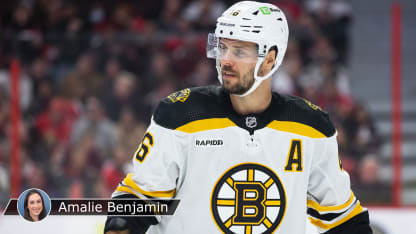
He thought back two seasons, to 2020-21, to the calculations that went through his head as he faced a global pandemic and an expiring contract and a calendar that just kept adding years to his age.
It had long been a goal to return to play in his home country after his NHL career was over. But at 35 years old, he had started to worry.
What if I wait too long? What if I don't make it?
He couldn't take that chance.
"It was maybe a lose-lose situation, but at the same time, win-win situation," Krejci said that day in September. "I obviously had the opportunity to come back last year, to re-sign, or to be a free agent, but I wasn't going to be a free agent. I didn't want to be anywhere else.
"But at the same time, I guess the biggest thing was, if I sign here last year and then would go home this season, I would take the chance of getting injured. I'm not getting younger. And if I would get injured, I think I would regret it for the rest of my life."
Krejci knew that his body wasn't what it had been in his 20s, that there was a risk in even one more season in the NHL. Money was no longer an issue, coming off a six-year contract that paid the center $43.5 million ($7.25 million average annual value).
So on July 30, 2021, Krejci announced that he would be leaving the NHL to return to his home country. He would go to Olomouc, less than 15 miles from his native Sternberk, to play in front of his parents and his brother and his nephew, to let his kids drop by to see their grandparents on a whim, to spend Christmas at home for the first time in 20 years, to whittle down a debt that he knew could never really be repaid.
"That was very hard," Krejci said. "But I had to kind of put [my NHL goals] aside and put family in front of it because they sacrificed so much. My parents and my brother, especially. Without them, I wouldn't be here."
He did not say then if he would return. It seemed, after 15 seasons in the League, all of them for the Bruins, that Krejci might have played his last game in the NHL.
He was going home.
\\\\
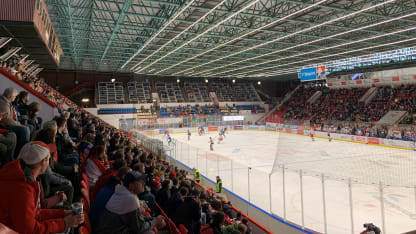
Zimni Stadion rises like a monolith, behind a hospital and not far from Horni namesti, the central square of Olomouc, a city about 2 1/2 hours from Prague by train. It opened its doors in January 1948, a month before the Communist Party of Czechoslovakia took over a country it would control for more than 40 years.
The building is old and small, seating 5,500 fans, a relic from another era both of hockey and of the Czech Republic. Light filters in from the opaque glass panels near the roof and the ceiling is a maze of green beams marked by rust.
There are moments when Boston doesn't feel all that far away, the familiar strains of "Sweet Caroline" suffusing the arena during warmups and the thwacking of pucks against the boards. There are others when it is quite clear that this is not the NHL, including as one of that night's scratches flops into a chair in the press room and flips on a steeplechase race from Pardubice.
The concession stands feel like a nod to a high school basketball game, albeit one that goes heavy on the beer sales. Along the second-story concourse, there is a folding table set out with just a few select Olomouc items, koozies and baby onesies, scarves and baseball caps, given that the tiny team store is closed Sundays and Mondays. Another folding table serves beer out of kegs and Coke out of 2-liter bottles.
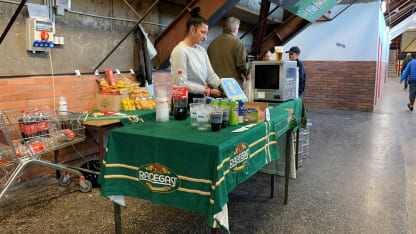
But, as game time nears, the noise starts up a steady drumbeat, one cheer into the next into the next. A man in a black T-shirt, bullhorn in hand, steps up onto his perch overlooking the ice and faces the section of the fullest-throated fans. They start in again, waving scarves and flags, some of them stitched with Krejci's face, in black and white.
The sounds swell through Zimni Stadion, a rising chorus of cheers and songs and banging drums and clapping hands, all while the action on the ice continues. They seem so close, these fans, and they are. Some still have Krejci's name stamped across their backs, HC Olomouc jerseys purchased last season amid the excitement of his surprise appearance back home, a star far from his own orbit that they embraced as one of their own -- because he was.
"Everybody here loved David Krejci and what he did for his family to give his children the opportunity to live here for one year," said Jan Dosoudil, who lives in Prague and has seen Krejci play in Olomouc and Boston. "And for his parents, it must have been really, really great. We absolutely adore him and we miss him, for sure. But I think everybody here understood that he's on a completely different level."
He scored in his first game there, and 19 more times, finishing the season with 46 points (20 goals, 26 assists) in 51 games, creating what coach Jan Tomajko called "university" for the team's young players, and an unforgettable season for the team's fans.
"They had a big poster: 'The King is back. Welcome back, David'," Jakub Jarolim, the team's physiotherapist, said of Krejci's first game for Olomouc. "The first play, he scored a goal and they were screaming his name. The crowd was crazy. They called it Krejci-mania in Olomouc."
It's easy to imagine. Even now, in a game against Kladno, the stands echo as Olomouc scores once, twice, three times, in a 3-0 win.
After the game is over, the players gather at center ice and acknowledge the crowd, lining up in a row and shaking their sticks, while the fans shake their scarves in return, the players taking the time to face each corner of the stadium before finally leaving for the locker room. The fans will stay, the chants continuing long after the ice is emptied, until the goalie, Branislav Konrad, returns to take swings with his goalie stick, egging on the crowd, entertaining them for a few more minutes, until they finally start to spill out onto the street, some still singing.
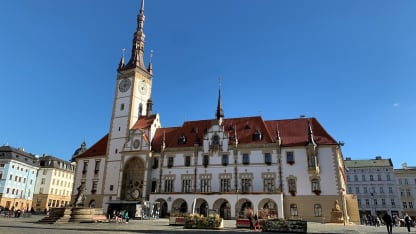
\\\\
Krejci had hoped that his children would learn Czech, and that was his one disappointment. Neither did.
Daughter, Elina, 7, skipped the all-Czech language kindergarten in favor of a more comfortable hybrid Czech-and-English first grade. Son, Everett, 3 1/2, was around his grandparents all the time, but the language didn't rub off as they had expected.
"You can't have everything," Krejci said.
The rest, though, was all that Krejci had hoped for.
He had long come home in the summers, spent time with his family then, but it was never the same. He never got to drop by on a weekday or celebrate the holidays.
Instead, for an entire season, his parents, Zdenek and Renata, saw his children almost every day. They went to games, home and away, in a country where even the road games are no more than a couple hours' drive. They went skiing on the weekends. They spent Christmas together, for the first time since Krejci left Sternberk at 14 years old.
Now, his apartment was 20 minutes away from them. His brother -- also Zdenek -- and his girlfriend and son were a five- or 10-minute walk away.
"You're bored, you just call them," Krejci said. "My parents, I didn't call. We'd just show up."
The kids would run around at their grandparents'. He and his brother would just sit and chill and talk.
"When I moved back, it was realizing how much they sacrificed," Krejci said. "I had to be on the ice every day. Somebody had to drive me, somebody had to dress me, every day, for a long time until I was able to do it by myself.
"The older I got, and having kids, I realized that it's time to start paying back. I feel like that was a good start. I want to do more eventually, but that was definitely a good start to show them the respect. And even though I didn't tell them, but I think they know why I came back, to be around them.
"Without them, I wouldn't be here. Without their support. Especially my brother. He's one year older than me and he was a player as well. And he didn't make it and I did. I'm sure that had to be hard on him at first when I was getting the calls and he didn't. But he never showed any sign of jealousy or anything. And lately I've been realizing that more and more. So I just wanted to be there for them."
\\\\
Krejci came to this team and this city for his family. He found another.
"I loved it there," Krejci said. "I loved the guys. The room was so close."
The games started at 5 p.m., and after, the players -- often as many as 10 to 20 -- would say good night to their wives and girlfriends, would kiss their kids and join their teammates for dinner and beers. On this night, in early October, eight or 10 players are headed for Restaurant U Morice, a spot tucked off the main square, a quick walk from Zimni Stadion.
"It wasn't planned," Krejci said. "It was just, after the game, some guy would always ask, 'Where are we going? Who's coming?' And then just, guys would go."
HC Olomouc isn't one of the richer teams in the Czech Extraliga, so the bonus checks that came with winning a game -- the same size for every player, including Krejci -- could often mean almost as much as the players' salaries, lending an extra festiveness to a win.
"Three minutes [later], you are dressed and you have a beer in hand," said forward Rostislav Olesz, who played 365 NHL games for the Florida Panthers, Chicago Blackhawks and New Jersey Devils before returning to the Czech Extraliga. "Enjoy the moment over here."
The fans would welcome them to spots around town, requiring only of their players that they show up again for the next game and give it everything. Olesz, who played for Extraliga team HC Vitkovice in Ostrava after his time in the NHL, said that the relationship between the fans and the team and the players here is more forgiving, more understanding, more human than he has experienced elsewhere, even other parts of the Czech Republic.
"In Olomouc, the atmosphere here, it's way different," Olesz said. "They care about how we play, but if we win or lose, it kind of matters, but if you leave everything on the ice, they are happy. You can win 1-0 or lose 6-0, they understand the quality of the other team and everything.
"… And you can see it, guys enjoy the game. People enjoy the game."
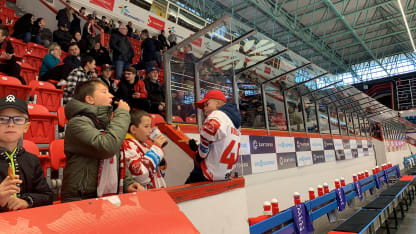
And they enjoyed watching Krejci play, even his teammates. Olesz laughs as he recalls the team encouraging Krejci never to leave the ice, to play through on a four-minute power play, delighting in his skill and talent, that ability to see the game and slow it down that he had shown for so long in Boston.
"His playing is out of this level," Tomajko said. "These players, from our club, the first week he was here, they had open mouths."
Krejci had known some of his teammates for many years, including team captain Jiri Ondrusek, who had gone to elementary school with him. He had lived with defenseman Jan Svrcek for two years in high school. There was a familiarity to the team, the players, the way of life.
This, after all, was what he had watched growing up, when Internet and NHL highlights were scarce. It was the team he had dreamed about playing for when the NHL was merely a figment and this team was so much more real.
"The team I was on, they treated me like -- I don't even think I deserved to be treated that way," Krejci said. "The organization. The fans. The fans there are crazy. It's different than here. It's like soccer fans. They chant the whole game. They make signs, huge signs.
"Obviously here (in Boston), when they start saying, 'Go, Bruins, go,' and it's 17 or 18,000, it's loud. It's awesome. But there it's a little bit different. That was the experience I wanted to get."
\\\\
When Krejci returned to Boston for this season, he returned alone.
His wife, Naomi, and his kids are in South Carolina on Daniel Island, where the family intends to live after Krejci's eventual retirement, near her family. With their Boston-area house sold, Krejci moved into a three-bedroom rental in the city, an echo of his younger days in the NHL, after signing a one-year contract Aug. 8 worth $1 million plus $2 million in performance bonuses.
"I learned this way that I'm going to have to put my family first," he said.
But he knew he wasn't done with the NHL, not even with a career in which he has played 967 games in the League and scored 735 points (217 goals, 518 assists), including five points (two goals, three assists) in his first give games back this season.
BOS@WSH: Krejci scores in return to Bruins
He wanted this, to return, to experience the Winter Classic back in Boston, at Fenway Park, on Jan. 2. To play his 1,000th game in the League, to have the chance to win and experience NHL arenas again, to take one more shot at the Stanley Cup with Patrice Bergeron and Brad Marchand, teammates who helped him raise it in 2011.
"I look at it so much differently this time around than before," Krejci said. "I know it's going to be hard. I'm going to miss my family, seeing the kids every day. If that's going to be hard, then this is it. I'm going to be 37 in the middle of this year (April 28), so there's no shame in walking away, even if I have a really good year, which I believe I will, playing with the players we have here."
He has felt comfortable immediately, slipping into the routines of a decade and a half, after debuting in 2006-07 as a 20-year-old and growing up in the city as an at-times underappreciated No. 2 center to Bergeron's No. 1. He has gotten to play with close friend David Pastrnak and either Taylor Hall or fellow Czech native Pavel Zacha, and helped the Bruins get off to a 4-1-0 start entering their home game against the Minnesota Wild on Saturday (1 p.m. ET; NHLN, SN, NESN, BSN, BSWI).
"That's the reason why I'm here too," Krejci said. "Not just to play the year out and say, 'Oh, I got 1,000 games' or something. I want to accomplish something. I want the playoff feeling again.
"Whatever happens after that, I don't know. Maybe halfway through the season it's going to be really hard missing the kids and I'm just going to say, 'You know, this is it, I'm going to finish it and that's it.' Or maybe they're going to do really well. We'll see."
